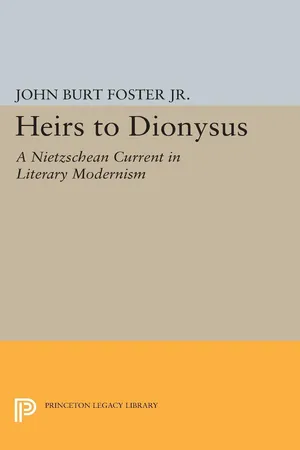
- 490 pages
- English
- PDF
- Available on iOS & Android
About this book
Building on recent transformative theories of influence, John Foster explores the many ways Nietzsche's intellectual and artistic example helped shape an interconnected series of major literary projects from 1900 to the 1940s. He portrays Nietzsche as a stimulating but disturbing force who left a well-defined legacy of concerns that modernists appropriated for their fiction. The author focuses particularly on Gide, D. H. Lawrence, Malraux, and Mann, analyzing their strategies of acceptance, revision, and subversion.
Originally published in 1982.
The Princeton Legacy Library uses the latest print-on-demand technology to again make available previously out-of-print books from the distinguished backlist of Princeton University Press. These editions preserve the original texts of these important books while presenting them in durable paperback and hardcover editions. The goal of the Princeton Legacy Library is to vastly increase access to the rich scholarly heritage found in the thousands of books published by Princeton University Press since its founding in 1905.
Frequently asked questions
- Essential is ideal for learners and professionals who enjoy exploring a wide range of subjects. Access the Essential Library with 800,000+ trusted titles and best-sellers across business, personal growth, and the humanities. Includes unlimited reading time and Standard Read Aloud voice.
- Complete: Perfect for advanced learners and researchers needing full, unrestricted access. Unlock 1.4M+ books across hundreds of subjects, including academic and specialized titles. The Complete Plan also includes advanced features like Premium Read Aloud and Research Assistant.
Please note we cannot support devices running on iOS 13 and Android 7 or earlier. Learn more about using the app.
Information
Table of contents
- Cover
- Contents
- Acknowledgments
- Note on Translation, Annotation, and Abbreviation
- Introduction
- I. Influence as Transformation, Nietzsche as Influence
- II. Nietzsche's Legacy to the Modernists
- III. From Nietzsche to the Savage God: An Early Appropriation by the Young Gide and Mann
- IV. Holding Forth Against Nietzsche: D. H. Lawrence's Novels from Women in Love to the Plumed Serpent
- V. Preceded by Nietzsche's Madness: Malraux as a Novelist in Man's Fate and The Walnut Trees of the Altenburg
- VI. Enter the Devil: Nietzsche's Presence in Doctor Faustus
- Conclusion
- Chronology of Works, Writers, and Events
- Notes
- Index